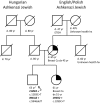Hereditary cancer screening: Case reports and review of literature on ten Ashkenazi Jewish founder mutations
- PMID: 30152102
- PMCID: PMC6305650
- DOI: 10.1002/mgg3.460
Hereditary cancer screening: Case reports and review of literature on ten Ashkenazi Jewish founder mutations
Abstract
Background: Historically, three founder mutations in the BRCA1/2 (OMIM 113705; OMIM 600185) genes have been the focus of cancer risks within the Ashkenazi Jewish (AJ) population. However, there are several additional mutations associated with increased susceptibility to cancer in individuals of AJ ancestry.
Methods: We report three patients who exemplify the need to keep these additional founder mutations in mind when pursuing hereditary cancer genetic testing of individuals in this population. All gene sequences in this paper were aligned to reference sequences based on human genome build GRCh37/UCSC hg19.
Results: review of the literature discusses that the combined risk is 12.36%-20.83% forhaving 1 of the 10 hereditary cancer AJ founder mutations in the BRCA1, BRCA2, CHEK2 (OMIM 604373), APC (OMIM 611731), MSH2 (OMIM 609309), MSH6 (OMIM 600678), and GREM1 (OMIM 603054) genes for individuals of AJ ancestry.
Conclusion: We recommend testing for all 10 of these AJ founder cancer susceptibility mutations for individuals within this population as standard screening in order to ensure appropriate cancer risk management and cascade testing.
Keywords: APC; BRCA1; BRCA2; CHEK2; GREM1; MSH2; MSH6; Ashkenazi; Jewish; breast cancer; cascade testing; colon cancer; founder mutations.
© 2018 The Authors. Molecular Genetics & Genomic Medicine published by Wiley Periodicals, Inc.
Figures
Similar articles
-
Prevalence of nonfounder BRCA1/2 mutations in Ashkenazi Jewish patients presenting for genetic testing at a hereditary breast and ovarian cancer center.Cancer. 2019 Mar 1;125(5):690-697. doi: 10.1002/cncr.31856. Epub 2018 Nov 27. Cancer. 2019. PMID: 30480775
-
Cancer Susceptibility Genetic Testing in a High-Risk Cohort of Urban Ashkenazi Jewish Individuals.J Genet Couns. 2018 Dec;27(6):1405-1410. doi: 10.1007/s10897-018-0269-x. Epub 2018 Jun 26. J Genet Couns. 2018. PMID: 29946849
-
Genetic Predisposition to Breast Cancer Due to Mutations Other Than BRCA1 and BRCA2 Founder Alleles Among Ashkenazi Jewish Women.JAMA Oncol. 2017 Dec 1;3(12):1647-1653. doi: 10.1001/jamaoncol.2017.1996. JAMA Oncol. 2017. PMID: 28727877 Free PMC article.
-
Peritoneal carcinoma in women with genetic susceptibility: implications for Jewish populations.Fam Cancer. 2004;3(3-4):265-81. doi: 10.1007/s10689-004-9554-y. Fam Cancer. 2004. PMID: 15516851 Review.
-
Hereditary breast cancer in Jews.Fam Cancer. 2004;3(3-4):249-57. doi: 10.1007/s10689-004-9550-2. Fam Cancer. 2004. PMID: 15516849 Review.
Cited by
-
A regional population-based hereditary breast cancer screening tool in Italy: First 5-year results.Cancer Med. 2020 Apr;9(7):2579-2589. doi: 10.1002/cam4.2824. Epub 2020 Feb 11. Cancer Med. 2020. PMID: 32045136 Free PMC article.
-
A Rare TP53 Mutation Predominant in Ashkenazi Jews Confers Risk of Multiple Cancers.Cancer Res. 2020 Sep 1;80(17):3732-3744. doi: 10.1158/0008-5472.CAN-20-1390. Epub 2020 Jul 16. Cancer Res. 2020. PMID: 32675277 Free PMC article.
-
The Molecular Detection of Germline Mutations in the BRCA1 and BRCA2 Genes Associated with Breast and Ovarian Cancer in a Romanian Cohort of 616 Patients.Curr Issues Mol Biol. 2024 May 12;46(5):4630-4645. doi: 10.3390/cimb46050281. Curr Issues Mol Biol. 2024. PMID: 38785549 Free PMC article.
-
Characterizing germline APC and MUTYH variants in Ashkenazi Jews compared to other individuals.Fam Cancer. 2021 Apr;20(2):111-116. doi: 10.1007/s10689-020-00198-x. Epub 2020 Aug 3. Fam Cancer. 2021. PMID: 32743790 Free PMC article.
References
-
- Bahar, A. Y. , Taylor, P. J. , Andrews, L. , Proos, A. , Burnett, L. , Tucker, K. , … Buckley, M. F. (2001). The frequency of founder mutations in the BRCA1, BRCA2 and APC genes in Australian Ashkenazi Jews: Implications for the generality of the U.S. population data. American Cancer Society, 92, 440–445. - PubMed
-
- Daly, M. B. , Pilarski, R. , Berry, M. , Buys, S. S. , Farmer, M. , Friedman, S. , … Darlow, S. National Comprehensive Cancer Network Guidelines (2018). Genetic / Familial High‐Risk Assessment: Breast and Ovarian (Version 1.2018). Retrieved from http://www.nccn.org/ Accessed May 14, 2018
-
- Foulkes, W. D. , Thiffault, I. , Gruber, S. B. , Horwitz, M. , Hamel, N. , Lee, C. , … Ellis, N. A. (2002). The founder mutation MSH2*1906G>C is an important cause of hereditary nonpolyposis colorectal cancer in the Ashkenazi jewish population. American Journal of Human Genetics, 71, 1395–1412. 10.1086/345075 - DOI - PMC - PubMed
Publication types
MeSH terms
Substances
LinkOut - more resources
Full Text Sources
Other Literature Sources
Medical
Miscellaneous




